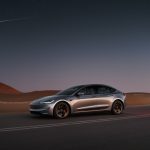
- Earnings
- Electric Vehicles
- Mobility Tech
Volkswagen Cuts 2025 Profit Outlook as U.S. Tariffs Hit Earnings
5 minute read

Volkswagen’s profit margin faces steep decline as U.S. automotive tariffs force global supply chain adjustments
Key Takeaways
- Volkswagen cuts 2025 guidance dramatically as operating return on sales forecast drops to 4-5% from previously expected 5.5-6.5%, with U.S. tariffs driving the sharp revision.
- Second-quarter operating profit plunges 29% to €3.83 billion from €5.4 billion year-over-year, missing analyst expectations of €3.94 billion amid tariff pressures and restructuring costs.
- U.S. tariffs of 25% impact pricing and margins with some Volkswagen models potentially increasing by $10,000 or more, forcing the automaker to absorb costs that cannot be fully passed to consumers.
Introduction
Volkswagen faces mounting pressure from U.S. trade policies as the German automaker reports its steepest profit decline in recent quarters. Europe’s largest carmaker posted a 29% drop in second-quarter operating profit to €3.83 billion, significantly missing analyst expectations while slashing its full-year guidance.
The results underscore the vulnerability of globalized automotive supply chains to trade disputes. Volkswagen now expects an operating return on sales of just 4-5% for 2025, down from its previous forecast of 5.5-6.5%, as U.S. tariffs of 25% on imported vehicles reshape the company’s profitability outlook.

Key Developments
Volkswagen’s financial performance deteriorated sharply in the second quarter as tariff costs mounted. The company reported operating profit of €3.83 billion compared to €5.4 billion in the same period last year, while revenue of €80.8 billion fell short of analyst expectations of €82.2 billion.
The automaker provided its first comprehensive assessment of how U.S. trade policies impact its 2025 earnings outlook. Full-year sales projections were revised downward to match last year’s levels, abandoning previous expectations for growth of up to 5%.
Restructuring efforts continue as Volkswagen works to eliminate over 35,000 jobs by the end of the decade. These measures, combined with tariff impacts, contributed to the company’s weakened financial position in the first half of 2025.
Market Impact
Volkswagen shares declined following the guidance revision as investors absorbed the magnitude of tariff-related challenges. The stock movement reflects broader concerns about European automakers’ exposure to U.S. trade policies.
The automotive sector faces heightened scrutiny as trade tensions escalate. President Trump’s threat to raise duties on EU auto imports to 30% from August 1 adds uncertainty to an already challenging environment for European manufacturers.
Volkswagen’s half-year operating result fell 33% to €6.7 billion from €10 billion previously, while net cash flow in the automotive division turned negative. The operating margin compressed to 4.2% from 6.3%, though excluding tariffs and restructuring costs, it reached 5.6%.

Strategic Insights
The tariff impact varies significantly across Volkswagen’s model lineup, with price increases of 5-28% depending on vehicle origin. Some models like the 2025 Tiguan SEL R-Line face potential price increases exceeding $10,000, creating competitive disadvantages in the U.S. market.
Despite profitability challenges, Volkswagen’s electric vehicle strategy shows progress. The company’s global share of battery electric vehicle deliveries increased from 6% to 10% year-over-year, with Western European BEV deliveries surging from 9% to 19%.
The company actively lobbies European trade negotiators to address the current 25% U.S. tariff on imported vehicles. This political engagement represents a key component of Volkswagen’s strategy to mitigate regulatory risks through supply chain adjustments.
Expert Opinions and Data
“Our half-year figures present a contrasting picture: on the one hand, we achieved strong product success and made progress in realigning the company,” said Arno Antlitz, chief financial officer at Volkswagen. “On the other, the operating result declined by a third year-on-year – also due to higher sales of lower-margin all-electric models.”
Antlitz highlighted that “increased US import tariffs and restructuring measures had a negative impact” on the company’s performance. The CFO’s comments reflect the complex challenge of balancing growth investments in electric vehicles with immediate profitability pressures.
According to CNBC, automotive analysts express concern over the long-term impact of tariffs on industry profitability and competitiveness. The consensus view suggests that European automakers face sustained pressure as trade disputes continue.
Market observers warn that U.S. consumers will experience higher prices for imported Volkswagen models. This pricing pressure could shift purchasing patterns toward domestically produced vehicles, fundamentally altering competitive dynamics in the American market.

Conclusion
Volkswagen’s significant guidance cut and profit decline demonstrate the tangible impact of trade policies on global automotive operations. The company assumes U.S. import tariffs of 27.5% will persist through the second half of 2025, acknowledging “high uncertainty” regarding future trade policy developments.
The automaker’s mixed performance across regions shows resilience in some markets while highlighting vulnerabilities in others. Order intake in Western Europe rose 19%, particularly for electric vehicles, even as North American operations face mounting pressure from tariff costs and competitive challenges.








